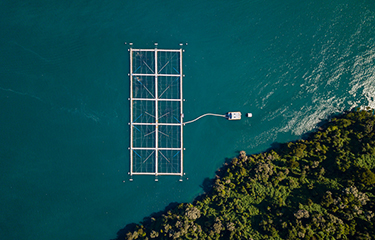While safeguarding workers’ health and taking preemptive measures against the closing of markets have topped Chilean salmon industry executives’ list of priorities throughout the COVID-19 crisis, the National Fisheries and Aquaculture Service (Sernapesca) has raised another concern: What happens if the fish die?
A number of seafood company employees have already implemented a work-from-home policy for most employees to allow them to minimize contact with other humans and reduce the spread of the virus, but the continued operations of salmon farms require the presence of some workers at farming facilities. A curfew was declared on 18 March as part of Chilean President Sebastian Piñera’s emergency measures, and isolation and the closing off of cities in the south was decreed for Puerto Williams and Chillán, as well as for Chiloé, an island with a large presence of salmon-farming firms. However, salmon farms and their employees are exempt from the restrictions, according to Chile’s Sub-Secretary of Fisheries and Aquaculture (Subpesca), as they must be compatible with a fundamental need of guaranteeing the availability of the country's food supply.
However, that could change, according to Health Minister Jaime Mañalich.
"I don’t rule out stricter measures being taken in the next few hours or days," Mañalich has said on national television. A very strict quarantine application may force the closure of plants; were that to happen, a health emergency caused by massive fish mortality could be forthcoming.
Sernapesca has moved to apply a set of 14 measures to favor salmon firms in avoiding such a health disaster. According to a report from SalmonExpert, the measures are divided into two groups:
- General measures
These include extending the term of stay in the collection centers, for which companies must submit the request indicating the number of days required for the specimens to enter the process. In the event of a process plant being closed, the movement of fish between collection centers may be evaluated.
Companies wishing to keep a certifier on premises for the Alexandrium catenella surveillance and control program must notify Sernapesca. The alternative is for companies to opt for maritime sampling.
Salmon producers may also choose to postpone and extend fertilization periods, and apply to extend the deadline established for the cleaning and disinfection procedures once the site has been fully harvested.
- Specific measures related to disease surveillance and control programs
These include extending the monthly validity of the sanitary movement certificate for up to three months, in the case of Atlantic salmon. Exemptions from sampling for Piscirickettsiosis may be considered, as well as the categorization of Caligidosis, given the impossibility of applying control measures. A report must be sent to Sernapesca justifying the reasons. ISA sampling may be performed by the company's veterinarian, while the categorization of Caligus and SRS programs may be made more flexible, depending on the health situation and pending a risk evaluation from Sernapesca.
The measures do not exempt the owners of the farming centers from the fulfillment of their action plans in the event of a contingency, due to escape or massive mortality.
In the meantime, given the extension to which the COVID-19 outbreak has affected the country, Chile’s environmental regulator SMA decided to activate a protocol for the aquaculture industry operating in the Los Lagos, Aysén, and Magallanes regions. The move looks to facilitate and encourage environmental compliance while safeguarding people's health.
The SMA called for the corresponding emergency plans to be activated in the event of specific contingencies at collection centers, salmon fattening centers, fish farms, transfer stations, and processing plants through the duration of the coronavirus pandemic.
Photo courtesy of Alexander Gold/Shutterstock







